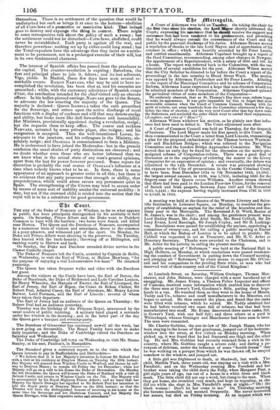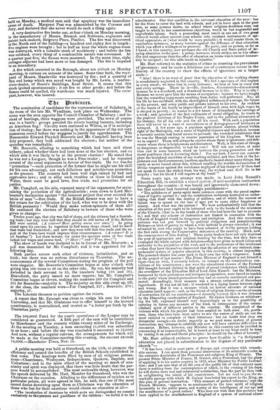be _Metropolis.
A Court of Aldermen was held on Tnesday. On taking the chair for the_ emit time slim his eleetien, the bind Ms), or shortly addressed the Court; expressing his ousurance thagise should receive the support and assistance that had been resoinred to. his predecessors, and promising that he would always consult the convenience of the Court and the public by the punctual discharge of his duties. Alderman Brown moved
a resolution of thanks to the late Lord Mayor, and of approbation of his conduct in office ; which was heartily seconded by Sir Peter Laurie, and carried unanimously. Alderman Copeland brought up a report of the Gaol Committee, recommending, among other changes in Newgate, the appointment of a Superintendent, with a salary of 300/. and 501 for a house. The report was referred back to the Committee, with the tes-
timonials of several candidates for the post. Alderman Wilson moved
that the City Solicitor be directed to lay before the Court a report of the proceedings in the late scrutiny in Bread Street Ward. The motion
was opposed by Alderman Farebrother and Sir Peter Laurie. Alluding to the report of the Municipal Committee and its scheme of Corporation Reform, Alderman Lucas expressed a hope that non-freemen would not be admitted members of the Corporation. Alderman Copeland quizzed the periodical virtue of some members of the Corporation— Be uniformly observed, that as St. Thomas's Day drew near, reform began to make its appearance. It was quite impossible for him to forget that inset memorable occasion when the Court of Common Council, blazing with the spirit of reform, cut away hundreds from the Committee allowances a few days before the time of election; and the very neat Court after that day down came the Reformers, and rescinded the order which went to curtail their enjoyments. (Laughter, and cries of" Hear!")
Alderman Wilson withdrew his motion, as he plainly saw that influ- ence had been used to defeat it. The Court adjourned soon after.
A Court of Common Council was held on Thursday, for the despatch of business. The Lord Mayor made his first speech to this Court. He then communicated to the Court a letter from Lordlincoln, transmitting a plan for the proposed embankment of the Thames between Westmin- ster and Blackfriars Bridges; which was referred to the Navigation Committee and the London Bridge Approaches Committee. Mr. Wire moved that an early day be fixed for the discussion on the newly-pro- mulgated scheme of Corporation-reform. There was a good deal of
discussion as to the expediency of referring the matter to the Livery Companies for an expression of opinion ; and eventually, the debate was adjourned to the 14th December. A return was presented showing the expense to the City of prosecutions in the Central Criminal Court,
to have been, from December 1834 to 7th November 1843, 10,5861.: the largest annual amount, in 1838, was 1,7851, including 6821. for the forgery-ease of the Queen versus Williams. Another return showed that there had been paid in the London Poor-law Union, for the removal of Scotch and Irish paupers, between June 1837 and 7th November 1843, 6,4441; the expense having rapidly increased from 1761. in 1838 to 2,6421. in 1842.
A meeting was held at the theatre of the Western Literary and Scien- tific Institution in Leicester Square, on Monday, to consider the pro- priety of establishing an asylum for the relief of the honseless and des- titute poor in the Metropolis. The Reverend J. G. Ward, Rector of St. James's, was in the chair ; and among the gentlemen present were Lord Dudley Stuart, Mr. John Abel Smith, Mr. Bond Cabbell, Sir De Lacy Evans, Lord Ranelagh, Sir Joseph Copley, and Sir H. Lushing- ton. Resolutions were passed for establishing the asylum, appointing a committee of twenty-one, and for calling a public meeting at Exeter Hall, at which the Bishop of London is to be asked to preside; Mr. CabbeIl was requested to act as Treasurer, and Mr. H. C. Arber as Honorary Secretary. Thanks were awarded to the Chairman, and to Mr. Arber for his activity in calling the present meeting.
A public meeting of " Reformers " was held at the National Hall in High Holborn, on Monday, at which resolutions were passed condemn- ing the conduct of Government in putting down the Clontarf meeting, and pledging all "Reformers," by every means to support Mr. O'Con- nell and his companions in the pending State trials as men who had deserved well of their country and of the United Kingdom !
At Lambeth Street, on Saturday, William Grainger, Thomas Man- chester, and John Hillman, were charged with a most barefaced act of smuggling. Mr. James Hyena, a Thames Police Inspector and officer of Customs, received some information which enabled him to discover the three men at Gower's Yard, Goodman's Stile, putting three hogs- heads in a van. He watched them as they went to the house of Messrs. Teddy and Co., tobacco and snuff manufacturers in the Minories, and began to unload. He then entered the place, and found that the casks were filled with tobacco, which he seized. Mr. Teddy admitted that he had before received two cases full of tobacco, but that had been manufactured into snuff. Mr. Evans discovered three more casks, full, in Gower's Yard, with one half full ; and three others at a yard in Whitechapel, whence Grainger and Manchester had been seen to issue. The men were remanded.
Mr. Charles Gubbins, the son-in-law of Mr. Joseph Hume, who has been staying in the house of that gentleman, jumped out of his bedroom- window into the street, at five o'clock on Monday morning. When picked up, it was found that he had fractured one thigh and the other leg. He and Mrs. Gubbins bad recently returned from a visit in the country, where Mr. Gubbins caught a severe cold; and during a pa- roxysm of delirium, under the influence of some "horrid dream" that be was walking on a parapet from -which he was thrown off, he strayed somehow to the window, and jumped out.
A little girl was frightened to death, at Shadwell, last week. The child, Matilda Tuck, three years old, was staying on a visit with a Mrs. Farnfield; and on the Wednesday evening Mrs. Farnfield, and her brother were taking the child down the Folly, when Margaret Peat, a girl eight years of age, ran out of a house in a white dress and black mask. The little child did not say a word, but clung to the man. When they got home, she trembled very much, and kept on repeating, as she did too while she slept in Mrs. Farnfield's arms at night—" Oh! the black woman I Don't let her come to me." On Thursday morning- she became insensible, and moaned frequently. She never recovered her senses, but died on 'Friday morning. At an inquest which was
held on Monday, a medical man said that apoplexy was the immediate cause of death. Margaret Peat was admonished by the Coroner and Jury, and declared that she never would do such a thing again.
A very destructive fire broke out, at four o'clock on Monday morning, in the manufactory of Messrs. Bramah and Robinson, engineers and patent lock-makers, Belgrave Place, Pimlico. The fire was discovered at the North end of the building—a hundred and eighty feet in length ; five engines were brought ; but in half an hour the whole engine-room was destroyed, with a valuable stock of machinery ; and before the fire was subdued, every thing of a combustible nature was consumed. At a quarter past five, the flames were mastered. In the mean time, eight cottages adjacent had been more or less damaged. The fire is imputed to an incendiary.
A fire which occurred in the Borough, about ten o'clock on Monday morning, is curious on account of the cause. Some time back, the rope. yard of Messrs. Mandeville was destroyed by fire ; and a quantity of flax and hemp which was saved was bought by Mr. Lewis, a marine- store-dealer, of Board's Buildings, Kent Street. It seems that this stock ignited spontaneously ; it set fire to other goods ; and before the flames could be quelled, the warehouse was much injured. The occu- pant, however, was insured.



























 Previous page
Previous page